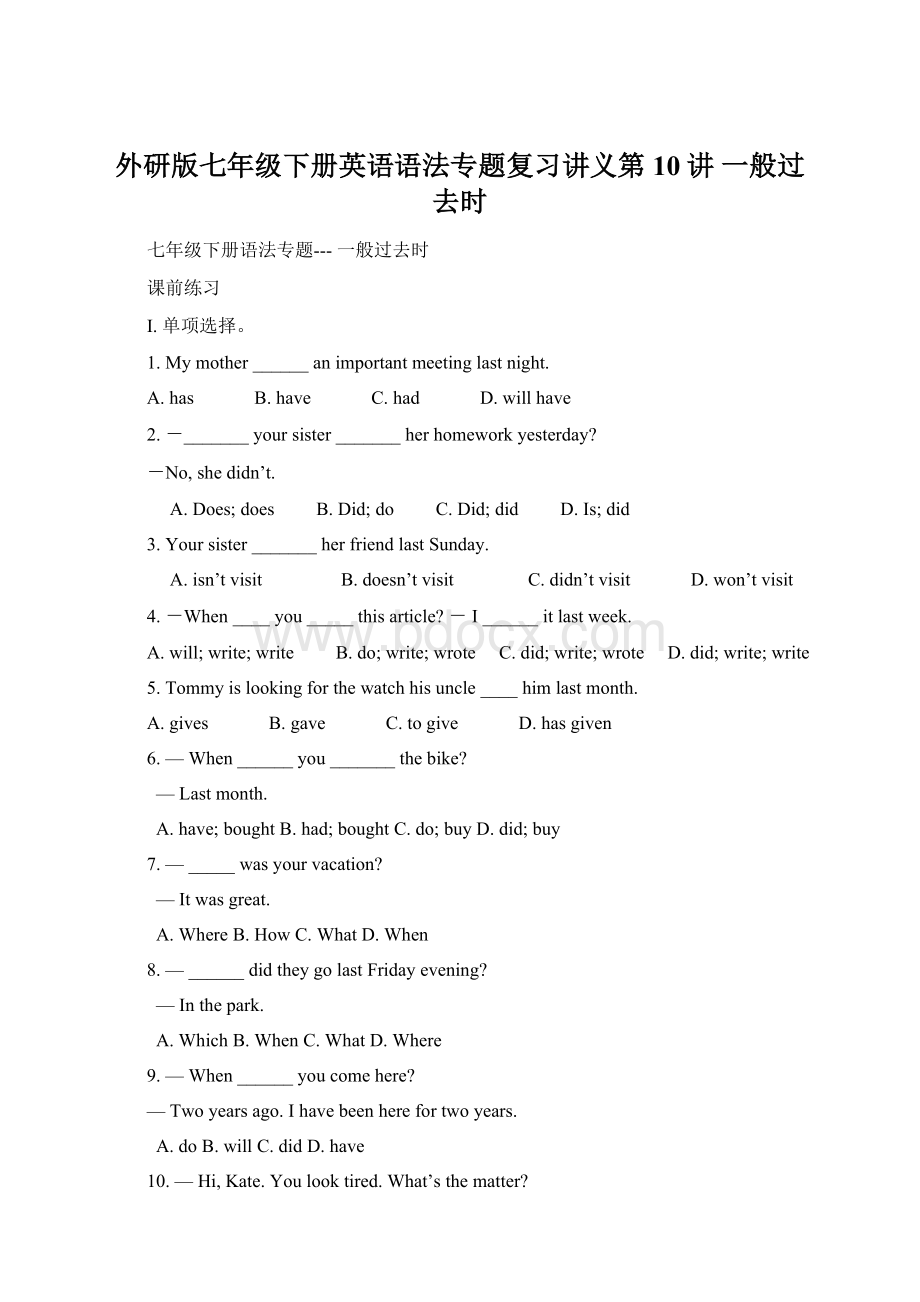 外研版七年级下册英语语法专题复习讲义第10讲 一般过去时.docx
外研版七年级下册英语语法专题复习讲义第10讲 一般过去时.docx
- 文档编号:6614110
- 上传时间:2023-01-08
- 格式:DOCX
- 页数:14
- 大小:26.50KB
外研版七年级下册英语语法专题复习讲义第10讲 一般过去时.docx
《外研版七年级下册英语语法专题复习讲义第10讲 一般过去时.docx》由会员分享,可在线阅读,更多相关《外研版七年级下册英语语法专题复习讲义第10讲 一般过去时.docx(14页珍藏版)》请在冰豆网上搜索。

外研版七年级下册英语语法专题复习讲义第10讲一般过去时
七年级下册语法专题---一般过去时
课前练习
Ⅰ.单项选择。
1.Mymother______animportantmeetinglastnight.
A.has B.have C.had D.willhave
2.-_______yoursister_______herhomeworkyesterday?
-No,shedidn’t.
A.Does;does B.Did;do C.Did;did D.Is;did
3.Yoursister_______herfriendlastSunday.
A.isn’tvisit B.doesn’tvisit C.didn’tvisit D.won’tvisit
4.-When____you_____thisarticle?
-I______itlastweek.
A.will;write;write B.do;write;wrote C.did;write;wrote D.did;write;write
5.Tommyislookingforthewatchhisuncle____himlastmonth.
A.gives B.gave C.togive D.hasgiven
6.—When______you_______thebike?
—Lastmonth.
A.have;boughtB.had;boughtC.do;buyD.did;buy
7.—_____wasyourvacation?
—Itwasgreat.
A.WhereB.HowC.WhatD.When
8.—______didtheygolastFridayevening?
—Inthepark.
A.WhichB.WhenC.WhatD.Where
9.—When______youcomehere?
—Twoyearsago.Ihavebeenherefortwoyears.
A.doB.willC.didD.have
10.—Hi,Kate.Youlooktired.What’sthematter?
—I______welllastnight.
A.didn’tsleepB.don’tsleepC.haven’tsleptD.won’tsleep
11.I______latefortheclassbecauseI______illyesterday.
A.were;were B.am;were C.am;am D.was;was
12.There______afilminthecinemalastnight.
A.is B.was C.were D.are
13.It______coldyesterday,butit______warmtoday.
A.is;is B.was;was C.is;was D.was;is
14.There______aballandtwobooksonthetablejustnow.
A.is B.was C.were D.are
15.LastSundaymyaunt______athomewithme.WewerewatchingTVallday.
A.was B.were C.is D.are
答案:
Ⅰ.单项选择。
1.C。
本句子的时间状语lastnight是表示过去的时间,所以用一般过去时,have/has的过去式是had。
2.B。
本句子是考查一般过去时的一般疑问句,用助动词did构成,在did的后面用动词原形。
3.C。
本句子是考查一般过去时的否定句,用助动词didn’t+动词原形构成。
4.C。
从对话后面回答和时间状语lastweek可以判断是一般过去时,在问句中用助动词did+动词原形构成。
后面的回答用一般过去时。
write的过去式是wrote。
5.B。
本题考查定语从句的时态,从句意为“手表是叔叔上个月给的”。
由“lastmonth”可知用一般过去时,所以选B.
6.D。
根据答语的lastmonth,可知应该用一般过去时;一般过去时的特殊疑问句,助动词应该用did,后面接动词原形,所以答案为D。
7.B。
根据答语可知,问句应该问“你的假期怎么样?
”,所以疑问词用how。
8.D。
根据答语可知,问句问的是地点,对地点的提问,应该用where。
9.C。
根据答语中的twoyearsago可知用一般过去时,一般疑问句助动词用did。
10.A。
根据答语中的lastnight可知用一般过去时,否定句用didn’t加动词原形,所以答案为A。
11.D。
根据句中的时间状语yesterday可知用一般过去时。
12.B。
根据时间状语lastnight可知用一般过去时;由因为主语是afilm,所以应该用was。
13.D。
根据句中的时间状语yesterday和today可知,第一个空用一般过去时,第二个空用一般现在时;因为主语是it,所以用was和is。
14.B。
根据justnow可知用一般过去时;therebe句型要遵循“就近原则,由aball决定谓语动词用单数形式,所以答案为B。
15.A。
根据lastSunday可知用一般过去时,因为主语myaunt是单数,所以用was。
一般过去时
【概念引入】
I.何时使用一般过去时?
一般过去时表示在过去某个时间里发生的动作或存在的状态。
例如:
LinTaoleftforShanghaiat8:
00yesterdaymorning.
林涛昨天早上八点去上海了。
Hewasilllastnight.
昨晚他生病了。
它可以具体分为以下几种情况:
1)表示过去经常或反复发生的动作。
例如:
LiTaoalwayswenttoworkbybuslastterm.
上学期李涛一直乘公共汽车上班。
2)表示已故的人曾经做过的事情。
例如:
LaoShewrotemanygreatworks.
老舍写过许多脍炙人口的作品。
3)表示过去所发生的一系列的动作。
例如:
Theoldmancameintotheroom,tookoffhisclothesandwenttobed.
这位老人走进屋,脱下衣服,然后上床睡觉了。
Mr.Blackgotupatsixo'clockthismorning,dressed,hadbreakfast,andwenttowork.布莱克先生今天早上六点起床、穿衣服、吃饭,然后去上班了。
II.如何识别一般过去时?
每个时态都会有其独特的标志性词语(主要是时间状语),我们可以称其为“标志词”。
一般过去时常见的标志词有:
1.yesterday,thedaybeforeyesterday.
2.lastweek/year/month/term…(简称last系列)
3.twohoursago,threeyearsago,amomentago…(简称ago系列)
4.in/on+过去的年/月/日,如in1999,onApril,2005
5.justnow,onceuponatime,oneday…
【用法讲解】
Ⅰ.be动词的一般过去时。
在使用一般过去时的句子中,如果句子的谓语是be动词,就要将be动词变为过去式。
主语是第一、第三人称单数,be用was;如果是第二人称或者其他人称复数,be用were。
它的一般疑问句是把was(were)提到句首;否定句是在was(were)的后面加not。
特殊疑问句是在一般疑问句的前面加特殊疑问词。
例如:
Mymotherwasbusylastnight.我的妈妈昨天晚上很忙。
(肯定句)
Weweren’tatschoolatthattime.那时我们不在学校。
(否定句)
Wereyouathomeyesterday?
你昨天在家吗?
(一般疑问句)
Wherewereyoulastnight?
你昨天晚上在哪里?
(特殊疑问句)
注意:
therebe句型中be动词的使用。
当主语是单数名词或者不可数名词时be动词用单数;当主语是名词复数时be动词用复数。
例如:
Therewasastrongwindjustnow.刚才有一阵强风。
Thereweremanypeopleinthesupermarketlastnight.昨天晚上超市有很多人。
Ⅱ.行为动词的一般过去时。
1)基本用法。
谓语动词是行为动词的句子,在一般过去时中,要将作谓语的行为动词变成过去式。
行为动词的过去式,一般情况下是在动词原形的后面加-ed构成,没有人称和数的变化。
例如:
Iwantedtohavearestjustnow.我刚才想休息一下。
它的否定句要在谓语动词的前面加助动词didn’t,此时,谓语动词要变成原形。
例如:
MymotherwatchedTVlastnight.我妈妈昨天晚上看电视了。
(肯定句)
Mymotherdidn’twatchTVlastnight.我妈妈昨天晚上没有看电视。
(否定句)
2)行为动词的过去式的构成。
在一般过去时的句子中,行为动词过去式分为规则变化和不规则变化。
规则变化有:
(1)一般在动词的后面加-ed。
例如:
work-worked,look-looked。
(2)以字母e结尾的动词,直接在词尾加-d。
例如:
like-liked,live-lived。
(3)以重读闭音节结尾并且词尾只有一个辅音字母的动词,先双写这个辅音字母,再加-ed。
例如:
stop-stopped。
(4)以辅音字母+y结尾的动词,先把字母y变为i再加-ed。
例如:
worry-worried。
不规则变化有:
do/does-did,go-went,write-wrote,see-saw,
begin-began,have/has-had等。
注意:
在英语中不符合变化规则的词很多,要特殊记忆。
例如:
Theyleftthefarmamomentago.他们刚刚离开农场。
Heswamintheriverandhadagoodtime.
他在小河里游泳并且玩得很开心。
3)行为动词的一般疑问句。
谓语动词是实义动词,一般疑问句要借助于助动词did。
句型为:
Did+主语+动词原形+宾语?
其回答仍借助于助动词,肯定回答用did,否定回答用didn’t。
例如:
—DidhewatchTVlastnight?
他昨晚看电视了吗?
—Yes,hedid./No,hedidn’t.是的,他看了。
/不,他没有看。
4)行为动词的特殊疑问句。
行为动词的特殊疑问句句式是:
“疑问词+did+主语+实义动词+其他?
”
Whatdidyoudothedaybeforeyesterday?
前天你们做什么了?
WhendidtheGreenfamilyarrive?
格林一家什么时候到达的?
拓展:
常见的特殊疑问词有:
人用who,whom;物用what;地点用where;时间用when,whattime;原因用why;频率用howoften;长度用howlong;距离用howfar等。
例如:
TheywenttherelastSunday.(对划线部分提问)
Whendidtheygothere?
TheboystayedinBeijingfortwoyears.(对划线部分提问)
HowlongdidtheboystayinBeijing?
巩固练习
一、单项选择
1.—Whatdidyoudoforyourmomonherbirthday?
—Iherabirthdaycake.
A.buyB.boughtC.willbuyD.havebought
2.—HasMaryevervisitedTowerBridge?
—Yes.She______ittwoyearsago.
A.visitsB.visitedC.hasvisitedD.wasvisiting
3.—WillyouseethefilmCinderellawithustonight?
—No,I_________itlastweek.
A.seeB.haveseenC.saw
二、填空题
A.用be动词的适当形式填空。
1.What______thenameofyourfirstteacher?
2.—______hisbrothersnaughty?
—Yes,they______.Butthey______well-behavednow.
3.—Where______youlastnight?
—I______atmygrandparents’home.
4.Where______YaoMingborn?
5.Myparents______inShanghaiin2006.
B.用括号内所给动词的适当形式填空。
1.Agirl_______(cry)forhelplastnight.
2.He_______(point)tothebookhewanted.
3.I_______(open)thewindowafterIgotup.
4.Heknockedonthedoorand_______(enter).
5.Tomjumpedupand_______(rush)tothedoor.
答案:
单项选择:
1.B。
由问句中did可知是一般过去时,所以答语也用一般过去时。
2.B。
twoyearsago是过去时间,一般与一般过去式连用,故选B。
3.C。
从答句后面的lastweek可知该句要用一般过去时,故选C。
填空题。
A.用be动词的适当形式填空。
1.was2.Were;were;are3.were;was4.was5.were
B.用括号内所给动词的适当形式填空。
1.cried2.pointed3.opened4.entered5.rushed
课后综合训练
I.单项选择。
1.MrZhang_______borninChengdu.
A.isB.areC.wasD.were
2.Manyforeignersarelooking_______toBeijing.
A.forwardstogoB.forwardstogoing
C.forwardtogoD.forwardtogoing
3.—WasLinglingborninXuzhou?
—_______.ShewasborninQingdao.
A.Yes,shewasB.No,shewasn’t
C.Yes,shewasn’tD.No,shewas
4.—Whatwasthename_______yourfirstschool,please?
—XinhuaPrimarySchool.
A.forB.toC.ofD.at
5.Weshouldbe________ourselvesinourstudy.
A.strictwithB.strictinC.strictonD.strictof
6.MrKingisfriendly_______usafterclass,butheisverystrict_______usinclass.
A.to;withB.to;inC.for;withD.for;in
7.There_______abiglivingroomandtwobedroomsinourhousefiveyearsago.
A.wasB.wereC.isD.are
8._______yourfirstclassroomlike?
A.whatwasB.WhatwasC.HowisD.Howwas
9.There’sariver_______manyfish_______it.
A.in;inB.with;withC.in;withD.with;in
10.—_______wasreallygreattohaveaswimintheriverinsummer.
—That’sright.
A.ThisB.ThatC.WhatD.It
11.Thefilmwasn’tinteresting.Everyonewas______.
A.funnyB.strictC.comfortableD.bored
12.—WhatdoesyournewEnglishteacherlooklike?
—Sheisabeautifulwoman_______longhair.
A.atB.forC.withD.of
13.Lucy_______astudentlastyear,butnowshe_______ateacher.
A.is;isB.was;isC.was;willbeD.is;was
14.—Wherewereyoulastmonth?
—I________onvacation(度假)inHawaii(夏威夷).
A.amB.willbeC.wasD.havebeen
15.Iboughtanicecreaminthe_______.
A.riverB.storeC.homeD.garden
【真题链接】
1.—I’mnotfinishedwithmydinneryet.
—Butourfriends_______forus.
A. wait B. waited C. are waiting D. were waiting
2.IreallyneedtotakemoreexercisebecauseI’mweight.
A.puttingoffB.puttingonC.puttingdownD.puttingaway
3.Ihadsome_______,vegetablesandtwoeggsfordinner.
A.riceB.noodleC.banana
II.完形填空。
Oncetherewasanoldmaninatown.Healwaysforgot1things.Sohiswifealwayshadtosaytohim,“Don’tforgetthis!
”
Onedayhewentonalongtrip(旅行)alone.Beforehe2home,hiswifesaid,“Nowyouhaveallthese3.Theyarewhatyouneedforyourtrip.Takecareofyourthingsduringthetrip.”Hewenttothestation,boughtaticketand4thetrainwithit.
Abouthalf5hourlater,theconductorbegantoseethetickets.Hecametotheoldmanand6,“Willyoupleaseshowmeyourticket?
”Theoldmanlookedforhisticketinallhispockets,buthecouldnotfind7.Hewasveryworried.“Ican’tfindmyticket.Ireallyboughtaticket8Igotonthetrain,”saidtheoldman.
“Ibelieve(相信)youboughtaticket.Allright,youdon’thavetobuy9one,”saidtheconductorkindly.“ButhowcanIknowwhereI’mgoing?
Ican’t10mystation!
”theoldmansaidsadly.
1.A.alotofB.akindofC.apieceofD.apairof
2.A.gotB.leftC.wentD.moved
3.A.moneyB.clothesC.ticketsD.things
4.A.hadonB.wentonC.gotonD.passedon
5.A.aB.anC.theD.this
6.A.sayB.saidC.saysD.saying
7.A.itB.thisC.thatD.ticket
8.A.when
- 配套讲稿:
如PPT文件的首页显示word图标,表示该PPT已包含配套word讲稿。双击word图标可打开word文档。
- 特殊限制:
部分文档作品中含有的国旗、国徽等图片,仅作为作品整体效果示例展示,禁止商用。设计者仅对作品中独创性部分享有著作权。
- 关 键 词:
- 外研版七年级下册英语语法专题复习讲义第10讲 一般过去时 外研版七 年级 下册 英语语法 专题 复习 讲义 10
 冰豆网所有资源均是用户自行上传分享,仅供网友学习交流,未经上传用户书面授权,请勿作他用。
冰豆网所有资源均是用户自行上传分享,仅供网友学习交流,未经上传用户书面授权,请勿作他用。


 铝散热器项目年度预算报告.docx
铝散热器项目年度预算报告.docx
